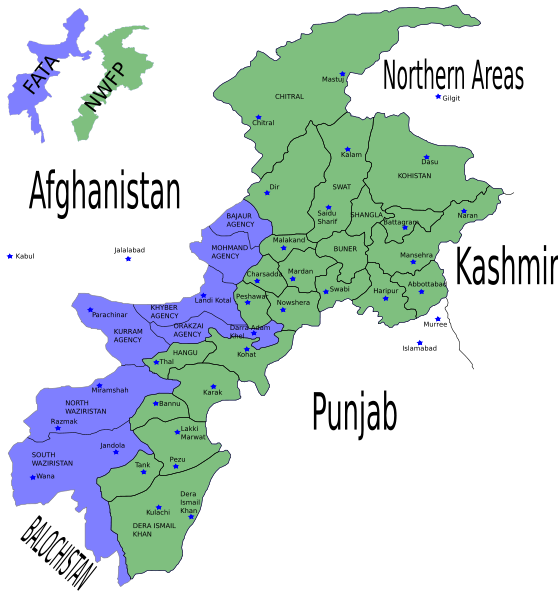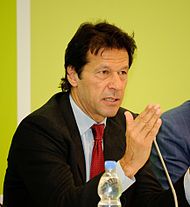Charismatic Pakistani opposition politician, Imran Khan, set out Saturday from Islamabad in a motorized convoy for a mobile protest by his Justice Party against continued US drone strikes on the tribal belt in northern Pakistan. His convoy, made up of all sorts of vehicles, was also joined by activists from Lahore and other cities. A group of semi-official bodyguards, the “Janissaries of Imran,” intended to provide security.
Imran Khan is a Panjab-born former cricketer and Pakistani nationalist of a relatively secular bent. His ex-wife is Jemima Goldsmith, a Briton of Jewish heritage. Imran Khan is wildly popular with the urban Pakistani middle classes, but he represents an urban, cosmopolitan, non-fundamentalist sensibility the opposite of what prevails in the Federally Administered Tribal Areas (FATA), which have become bastions of the Pakistani Taliban. That his family has roots in the North-West is thus discounted up there.
Fundamentalist leaders from the Northwest, such as Maulana Fazlur Rahman of the Jamiat Ulama-e Islam (F), deeply dislike Imran Khan and see him not as defending Pakistanis from US drones but as a secular Lahori carpetbagger coming into religious Pushtun territory. Some Pakistani Taliban leaders have threatened to attack the Justice Party convoy. Imran Khan says that Maulana Fazlur Rahman has spread smears such that Imran Khan was bring a contingent of Jews and Christians into the tribal belt (presumably using against him his ex-in-laws).
The Pakistani Taliban have warned against the convoy, denouncing Imran Khan as an ‘agent of Israel, the United States and Europe.’ They are powerful in Waziristan and don’t want competition from a famous and popular former sports figure.
The governor of the Khyber Pukhtunkhwa Province that abuts Waziristan, Masood Kousar, castigated Imran Khan for the planned convoy. He said that government troops had restored order to Waziristan with great difficulty, and that taking thousands of protesters there might destabilize it again. Moreover, he said, there was not way for the government to provide them security. South Waziristan is a stronghold of the Mahsoud tribe of Pushtuns, many of whom had supported the Pakistani Taliban Movement. The Pakistani army attacked South Waziristan in 2009 and put down the Mahsoud. North Waziristan is the stronghold of the Haqqani Network, old-time Mujahidin who are fighting both the US troops and the Karzai government in Afghanistan, and which appears to be backed by Pakistan’s military and its Inter-Services Intelligence.

Wikileaks demonstrated that high officials of the government of President Asaf Ali Zardari have behind the scenes authorized the US to hit suspected militants with drones on Pakistani territory, though the government now denies this charge.
Imran Khan, as a Pakistani nationalist, is outraged at this infringement of Pakistani sovereignty. He has begun being able to get 150,000 people out to his rallies, and is hoping to much expand his power base in next year’s elections. So the convoy to Waziristan is in part a campaign tactic.
Imran Khan says he is not worried about security.
It remains to be seen whether Pakistan’s powerful military, and the civil provincial governors, will allow the convoy to go all the way to Waziristan.
The Bureau of Investigative Journalism in the UK has found that US drone strikes often hit innocent non-combatants, and that some missions, where a second drone hits soon after the first, kill rescue workers and could be considered a war crime.




 © 2025 All Rights Reserved
© 2025 All Rights Reserved